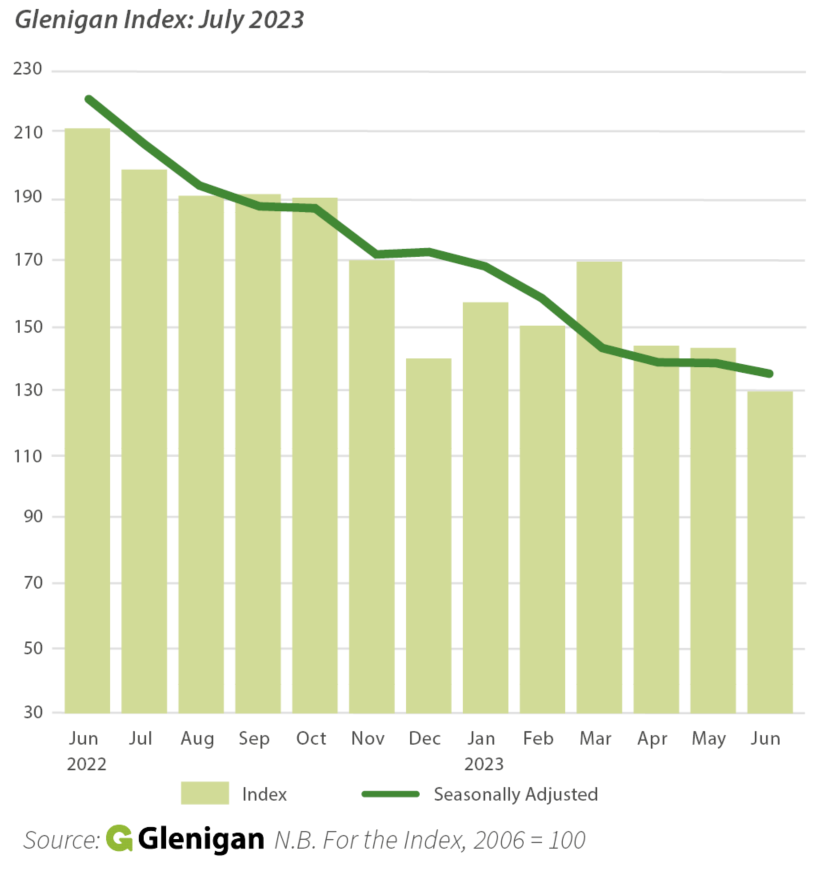
The July 2023 edition of Glenigan’s Construction Index shows that the value of underlying work starting on-site during the three months to June fell 5% against the preceding three months, standing 39% lower than a year ago. However, residential construction starts increased 10% on the preceding three months (albeit, falling back 40% on 2022 figures).
Covering all underlying projects with a total value of £100m or less (unless otherwise indicated), with all figures seasonally adjusted, the report shows that – heading into Q3 2023 – construction-starts “continue to slide on a consistent downhill trajectory.” Similar to previous, recent editions of the Index, “performance remained frustratingly sluggish across the sector, amid eye-watering price inflation, interest spikes, and widespread economic uncertainty.”
However, striking a more positive note, residential construction was shown to have rallied following a long-lasting period of depression, with starts-on-site increasing by a tenth during the Index period.
Allan Wilen, Glenigan’s Economic Director, commented: “Further weakening in project-starts in the second quarter is disappointing but unsurprising, with a continued slowdown largely attributed to the UK’s stagnant economic situation, which will likely persist into the latter half of the year. The UK economic outlook remains weak, denting investor and consumer confidence further and consequently stifling private sector activity.
“Particularly, civils starts have disappointed, which is a shame, given the Prime Minister and Chancellor’s big commitments to critical infrastructure. This is due, in part, to sharp drops in infrastructure approvals throughout 2022, feeding through to this year.”
Allan added: “Despite this, a modest residential project-start recovery is encouraging, which will be welcomed by many housebuilders, whose activity has stalled thanks to icy market conditions and a raft of new regulations. Whilst we’re not out of the woods yet, these nascent green shoots reflect the predictions made in our recent Construction Forecast, which expects the industry to return to growth in 2024 as UK economic prospects improve.”
Sector Analysis – Residential
Residential construction experienced a slight upturn during the three months to June as starts advanced 10% but stood 40% lower than a year ago.
Private housing also enjoyed a growth spurt, with starts increasing 17% against the preceding three months but weakening 46% compared with the previous year. Social housing performance was weak, finishing 9% down on the preceding three months, dropping back 3% on 2022 levels.
Sector Analysis – Non-Residential
The value of starts across non-residential sectors fell by 11% during Q.2, down 30% on a year ago, with most verticals experiencing decline against the previous year.
Hotel & Leisure experienced a relatively strong period, with work starting on-site increased by 2% against the preceding three months to stand 1% up on the previous year. Industrial project-start performance was mixed, with the value of starts increasing a modest 1% during the three months to June but remaining 33% lower than a year ago.
It was a similar story for health, where the value of underlying project-starts fell back 22% against 2022 levels, but, more positively, advanced 51% against the preceding three-month period. Offices project-start performance was especially poor, with project-starts weakening 38% during the three months to June to stand 57% lower than a year ago.
Retail project-starts also slipped back abruptly, declining 14% against the preceding three months to stand 44% down on the year before. Education and Community & Amenity also decreased 18% and 43% against the preceding three months, to stand 2% and 45% down on the previous year, respectively.
Civils work starting on-site dropped 40% against the preceding three months to stand 54% down on a year ago. Infrastructure starts dropped 35% during Q2, down 59% on the previous year’s figures. Utilities starts also declined 44% against the three months to the end of June, finishing 45% down on a year ago.
Regional Analysis
Regional performance was poor, with project-starts weakening across nearly every part of the UK during the three months to June.
Project-start performance in the North East and Northern Ireland was mixed, increasing 18% and 15%, respectively, but slipping back 33% and 7% on 2022 levels.
The East of England also experienced a mixed period, increasing 31% against the preceding three months but remaining 36% behind last year’s figures.
Wales suffered the heaviest fall, declining 46% against the preceding three months to stand 52% down on a year ago.
It was a similar story in Yorkshire & the Humber, with the value of project-starts decreasing 17% against the preceding three months and remaining significantly down (-41%) on the previous year.
Project-starts in the East Midlands also experienced falls against both the preceding three months (-1%) and previous year (-40%).
London and the South West weakened against the preceding three months, falling back 18% and 11%, respectively. Both regions were down on the previous year, remaining 36% and 46% lower than a year ago.
Scotland was down against both the preceding three months (-9%) and the previous year (-27%). This was also the case in the West Midlands, the South East, and the North West, which all crashed compared to both the preceding three months and previous year.
To find out more about Glenigan and its construction intelligence services click here.
2023 sees Glenigan celebrate its 50th anniversary, commemorating half a century of delivering “the highest-quality construction market intelligence.” To find out more about its services and expertise click here.









